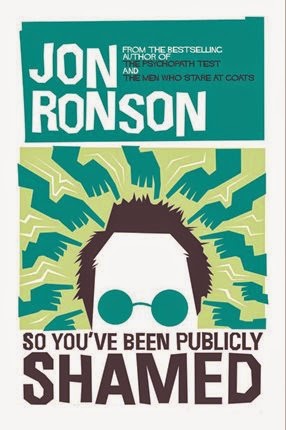Having watched (and reviewed) Frank recently, I've been on a bit of a roll with Jon Ronson. He's one of those writers that always seems to be sitting on my "oh, I must read that" list, someone who documents the stranger corners of the world in an open and deceptively free-roaming style. I first came across him with The Men Who Stare at Goats, which even got turned into a film you can file under "OK, Mostly" but never managed to quite capture the essence of the book. Then the really interesting and unexpected The Psychopath Test, another book of wandering around and meeting strange, interesting and occasionally terrifying people. This time, Ronson is drawn to look at the idea of Public Shaming, especially around the Brave New World of Social Media.
I've got to start by being honest that one of my big bugbears with Social Media is the howling mob mentality that it can generate. There is a reason that I rarely talk about Politics on twitter, and that usually any opinion I have is qualified, or nuanced, in some way that is very hard to get across in 140 characters. If you just want to yell "Down With This Sort of Thing", then its marvelous, but trying to get across any sort of complex idea, or engage with someone, rather than just lecturing them on "your opinion" is really hard. Social Media is also a self-selecting echo chamber, where you always find someone to confirm your bias, or re-tweet that cool re-tweet you already saw back at you, giving you the comfort that everyone is on your side.
So You've Been Publicly Shamed is an exploration of the phenomenon of shaming in the modern digital age. Its the idea that one stupid picture, or tweet, can move beyond your control, and out of context very quickly, and make you the focus of the hatred of strangers, and what that does to your life. Although a factual book, I always find the random wanderings of Ronson's writings to be surprising and that is part of the joy, so I won't go into too much detail of where it ends up, but suffice it to say that he talks to an interesting selection of people, and makes some interesting and surprising discoveries.
What I am left with the nagging sense that old habits die hard; that Shaming is somehow deeply rooted in our culture as a way of enforcing norms (both for good and ill) and really all we've done is move that basic behaviour online. The thing is, online is something we think of as ephemeral, something that is gone with the scroll of a screen, but of course it isn't. That data is still out there. That damage is still done. Somewhere along the line, our relationship with each other in the online space hasn't quite worked itself out, and we're still feeling our way through it. In that sense, this is a timely and important book - a fun, breezy and engaging read that tackles a subject that is weightier than we are prone to give it credit for.

No comments:
Post a Comment